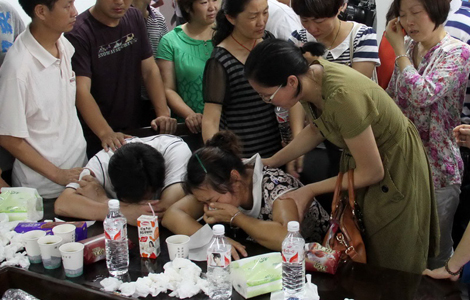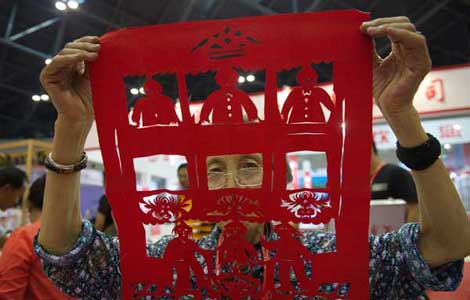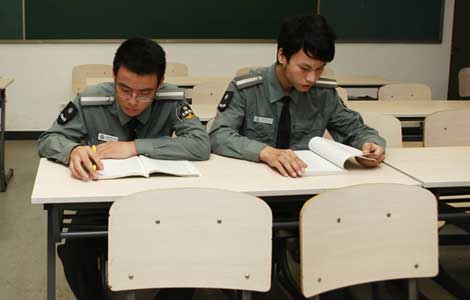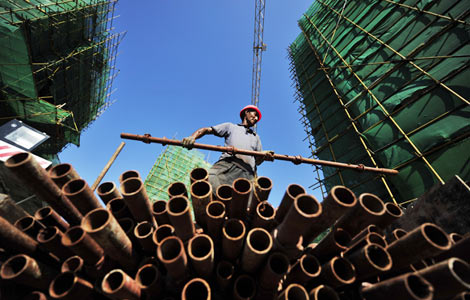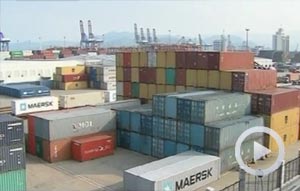Diplomat: Dialogue to reflect Sunnylands' cooperative spirit
Updated: 2013-07-08 11:56
By Chen Weihua in Washington and Li Jiabao in Beijing (China Daily)
|
||||||||
The fifth Strategic and Economic Dialogue will be another push by China and the United States to develop their relationship for the long term, a senior Chinese diplomat expects.
Unlike previous S&ED sessions, the meetings on Wednesday and Thursday in Washington will be led by a pair of newly installed officials from each side: China's State Councilor Yang Jiechi and Vice-Premier Wang Yang, and US Secretary of State John Kerry and Treasury Secretary Jacob Lew.
It will be the first meeting of senior Chinese and US officials since the early June summit in California between Presidents Xi Jinping and Barack Obama.
Cui Tiankai, China's ambassador to the US, said the S&ED is meant to address long-term, strategic term issues affecting bilateral relations. The four previous rounds of talks have been uniquely important in promoting ties and high-level communication, he said.
Cui said relations had "gotten off to a good start" since China's new leadership took power in March and Obama began his second term in January.
"The important consensus reached by leaders of both countries to build a new type of major-country relationship that is based on mutual respect and win-win cooperation has set the direction for China-US relations in the new period," the ambassador said.
"In the next stage, it calls for efforts by both sides to turn the willpower to build such a new type of relationship into policies and actions," said Cui, who described this cause as "unprecedented".
This week's S&ED will gather officials from more than 20 government departments to discuss an array of political, security, economic and financial matters.
In addition to events such as the joint opening ceremony, the two sides will meet for talks on strategic and economic tracks.
Officials will also conduct a number of other dialogues, including the third Strategic and Security Dialogue and the first meeting of the new China-US working group on cyber security.
"The Chinese side hopes that this dialogue will help implement the important consensus reached by the two heads of state, to reflect the spirit of no-conflict, no-confrontation, mutual respect and win-win cooperation in every aspect of China-US relations," Cui said.
He said the two countries should use innovative thinking and take practical steps to increase mutual trust, deepen cooperation and properly deal with differences in order to push bilateral relations on a track of long-term health and stability.
In Beijing, officials expressed hope that this S&ED will produce breakthroughs toward a China-US investment treaty.
The two sides are expected to discuss topics such as China's market-economy status, fair treatment for Chinese investments in the US, loosening of US restrictions on exports of high-tech goods, the spillover effect of US monetary stimulus through bond-buying, or "quantitative easing", as well as the progress of various free-trade negotiations in the Asia-Pacific region.
"I believe the S&ED will see fundamental progress on the investment treaty between China and the US," Vice-Minister of Finance Zhu Guangyao told a news conference on Friday.
The two countries officially started negotiations on a bilateral investment treaty in 2008, and the ninth round of talks was concluded in early June.
Chen Deming, president of the Chinese mainland-based Association for Relations Across the Taiwan Straits and a former commerce minister, said on July 1 that the pact would "set the basis" for global investment rules.
"Sino-US economic ties are intertwined and complicated, and both sides are seriously considering ways to further boost them following the leaders' recent agreements, and also ways to make economic and trade ties serve as the 'ballast' and 'propeller' for overall bilateral relations," Zhu said.
"We hope the US takes active measures and recognizes China's market-economy status as soon as possible," he added. "Meanwhile, we expect the US to loosen its restrictions on exports of high-tech goods for civil use in China, which would also benefit the US."
The US is China's second-biggest trade partner and largest export market. Bilateral trade rose 8.5 percent to $484.8 billion in 2012 from the previous year. During the first five months of 2013, bilateral trade increased 6.9 percent to $202.9 billion from the same period a year ago, according to China's General Administration of Customs.
Some economists say fewer restrictions on US high-tech exports to China would effectively balance the countries' trade relationship, in which China enjoys a substantial advantage. The imbalance totaled $315 billion in 2012.
Contact the writers at chenweihua@chinadailyusa.com and lijiabao@chinadaily.com.cn
(China Daily USA 07/08/2013 page1)
Most Viewed
Editor's Picks

|

|

|

|

|

|
Today's Top News
Boeing 777 passenger 'mumbled a prayer'
Ex-minister gets suspended death
Workers return after dispute
Job seekers should be cautious abroad
River pollution sparks criticism
Terror attack was planned: suspect
Booming security industry needs skilled youth
A bright future for native black pigs?
US Weekly

|

|
